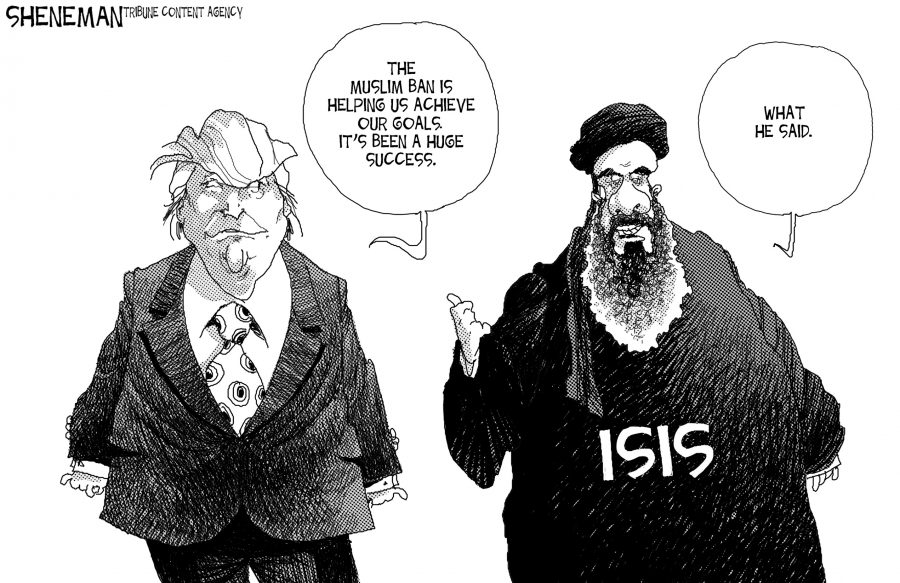Editorial: Don’t be distracted, Trump’s executive order is a ‘Muslim ban’
February 5, 2017
In his inaugural address, President Donald Trump promised that his administration would “…unite the world against radical Islamic terrorism, which we will eradicate completely from the face of the Earth.”
What he has done instead is sign an executive order — freezing all immigration into the US from seven Muslim-majority countries — which will have the complete adverse effect.
President Trump’s executive order is not only morally, legally and logistically treacherous, it is everything that terror cells could have hoped for.
For the last two years, Trump campaigned by stoking a fire of uncertainty and fear amongst his supporters. In front of crowds of thousands of people, he made radical claims about national security, terrorism and the entire religion of Islam.
These statements became a commonplace theme of his rhetoric. The more he made these claims, defended and danced around them, the more normalized they became.
As far back as last spring, Trump had called for a ban of Muslims from the U.S. He was elected in part on this idea, playing on the same tools of fear and persecution that terrorist organizations use to gain power.
And now that he is president, this executive order answers the one possible question every American could agree to ask: Would Donald Trump follow through on his campaign claims?
Don’t be fooled; this is the ‘Muslim ban’ called for so many times in the past. For the Trump administration to defend this order as anything but is laughable.
With a public intent to ban Muslims on record, an order that bans travel to the U.S. from seven Muslim-majority nations — Iraq, Iran, Libya, Syria, Somalia, Yemen and Sudan — is discriminatory in nature.
When that order includes a clause to admit religious minority groups from these countries — and the president publically says that Christians will be granted access to the U.S. — it is even more so.
This is a campaign promise that he intends to follow through on to prove his legitimacy with no regard to the horrific effect that this order will actually have.
For supporters of this action to think that this ban will improve security is willfully ignorant. This includes the overwhelming majority of Republicans in Congress who have stayed silent since it was declared.
Between 1975 and 2015, there have been no deaths on U.S. soil from terrorist attacks by anyone from these nations.
Of the 19 men involved in the terror attacks of Sept. 11, 2001, 15 were from Saudi Arabia, two from Egypt, one from Turkey and one from Lebanon. These countries are U.S. allies and not included in the list of “countries of concern.”
The Trump family also has significant business holdings in neighboring countries not affected by the ban including Saudi Arabia, Turkey, Egypt and The United Arab Emirates.
The U.S. already only takes a fraction of the total refugees from these countries and gaining entrance takes a minimum of 18 months of substantial background checks from multiple security agencies.
The justification to freeze immigration “until we get a hold on what’s going on” is as foolish as thinking that we don’t already know what is going on.
Morality cannot be legislated and the constitutionality of this order is unfortunately murky. But for anyone who boasts that America is a Christian nation, this action could not be in more direct opposition to Jesus Christ.
What is American and Christian in value, on the other hand, is the continual works of activists, lawyers, public figures and organizations like the American Civil Liberties Union to defend against and resist this order. Those who mobilized to airports and demanded the release of U.S. citizens and visa holders from custody deserve recognition.
Months ago, Pope Francis said it was hypocritical to “call yourself a Christian and chase away a refugee.”
As citizens of a free country and members of a Jesuit univeristy, Loyola students must heed this example from our Pope and these protesters.
Loyola students who respect the pillar of religious freedom must make their resistance heard. A portion of the country may want to use immigration bans of the past to justify today’s mistakes, but America was not built as an isolationist, religiously selective nation.
At the end of its first section, the executive order states, “the United States should not admit those who engage in acts of bigotry or hatred (including ‘honor’ killings, other forms of violence against women or the persecution of those who practice religions different from their own) or those who would oppress Americans of any race, gender or sexual orientation.”
Students with any measure of empathy must not let this painful hypocracy go on quitely.









Claire • Feb 16, 2017 at 9:41 am
Not siding with the man but…. If Trump were to actually sign a “Muslim ban”, he would have to include about 40 more countries.